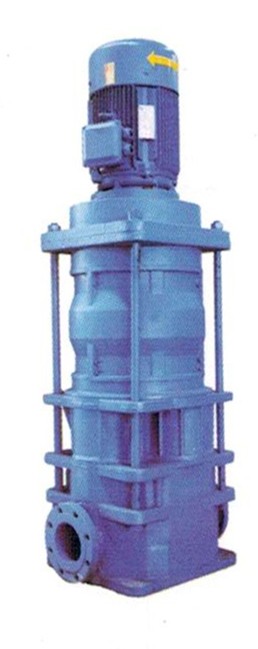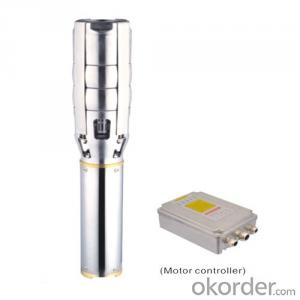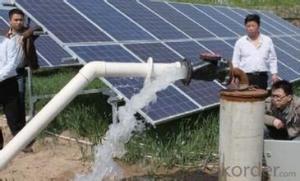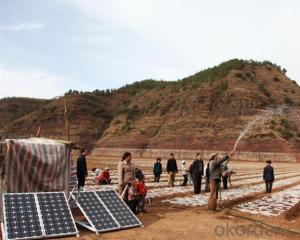Franklin Solar Pump L3D-20-360 Solar Water Pump
- Loading Port:
- China Main Port
- Payment Terms:
- TT OR LC
- Min Order Qty:
- -
- Supply Capability:
- 300 sets set/month
OKorder Service Pledge
OKorder Financial Service
You Might Also Like
Product description:
Product: Solar water pump
Model:L3D-20-360
Appilication:
surface pump
for surface water of pond, river, lake
for irrigation of a big farm with 10000 m2 on the top of a high mountain
Product specification:
flow rate:20m3/ hour, 140m3/day.
lift: 10m-360m
pump diameter: 610mm
Pump installed on the ground, outlet to the water surface:4m
with AC motor, motor power:22kW
but only need solar power:24kW(while Grundfos pump needs at least 45kW solar power, our pump can save more than 50% solar panel power,save USD15000 cost for solar panel per set.
Material:
Pump inside: stainless steel and wearable nylon,it enables our solar pump to have 10 years sevice life.
Motor : AC motor, 380V , three phase , 50Hz. The pump also can connect with grid power directly.
Certification:
3 International patent
ISO9001
CE
Warranty:2 years
- Q: How does a solar pump help in reducing the use of pesticides?
- A solar pump reduces the use of pesticides by providing a sustainable and reliable source of water for irrigation. By using solar energy to power the pump, farmers can efficiently water their crops, which helps in maintaining healthy plant growth and reducing the risk of pests and diseases. Adequate and timely irrigation promotes stronger plants that are more resistant to pests, thus minimizing the need for chemical pesticides.
- Q: Can solar pumps be used for water supply in remote healthcare clinics or facilities?
- Yes, solar pumps can be used for water supply in remote healthcare clinics or facilities. Solar pumps are an efficient and sustainable solution that can provide reliable access to clean water in areas without access to electricity. By harnessing solar energy, these pumps can operate independently, reducing the need for costly and unreliable diesel generators. This makes them a viable option for remote healthcare facilities, ensuring a continuous water supply for critical healthcare services.
- Q: Can solar pumps be used for livestock watering?
- Yes, solar pumps can indeed be used for livestock watering. Solar-powered water pumps are an excellent solution for providing a reliable and sustainable water source for livestock. These pumps use solar energy to power the water pump, eliminating the need for electricity or fuel. They are cost-effective, environmentally friendly, and can be easily installed in remote locations where traditional power sources might not be available. Overall, solar pumps are a great choice for livestock watering, promoting self-sufficiency and reducing operating costs for farmers.
- Q: Can solar pumps be used for water supply in golf courses or sports complexes?
- Yes, solar pumps can be used for water supply in golf courses or sports complexes. Solar-powered pumps can provide a sustainable and cost-effective solution for water supply, reducing dependence on grid electricity and minimizing operational costs. These pumps can efficiently draw water from ponds, rivers, or underground sources and distribute it for irrigation purposes, ensuring that golf courses and sports complexes maintain their desired level of water usage while minimizing environmental impact.
- Q: Can a solar pump be used in off-grid locations?
- Yes, a solar pump can be used in off-grid locations. Since solar pumps are powered by solar energy, they do not require a connection to the electrical grid. This makes them an excellent choice for remote areas or locations without access to electricity, as they can operate independently and provide water pumping solutions.
- Q: How does the type of water source (lake, river, borewell) affect the performance of a solar pump?
- The type of water source, whether it is a lake, river, or borewell, can affect the performance of a solar pump in a few ways. Firstly, the depth and quality of water in each source can vary. For instance, a river may have a consistent flow of water, while a lake may have fluctuating water levels. Similarly, a borewell may provide water from deep underground. These factors can impact the efficiency and effectiveness of the solar pump, as it needs to be properly calibrated and designed to handle the specific characteristics of the water source. Secondly, the type of water source can also determine the presence of impurities and sediments. Rivers and lakes may have higher levels of sediments and debris, which can affect the pump's performance. In such cases, additional filtration or pre-treatment may be required to prevent clogging or damage to the pump. Lastly, the availability of sunlight can also be influenced by the type of water source. For instance, if a solar pump is installed near a heavily forested river, the shade from trees may reduce the amount of sunlight reaching the solar panels, thereby affecting the pump's efficiency. In contrast, a borewell or an open lake may provide more exposure to sunlight, resulting in better performance. Therefore, considering the type of water source is crucial in selecting and installing a solar pump, as it ensures that the pump is designed and optimized to function effectively in that specific environment.
- Q: Can a solar pump be used in areas with limited access to transportation for maintenance visits?
- Yes, a solar pump can be used in areas with limited access to transportation for maintenance visits. Solar pumps are designed to be low-maintenance and can operate for long periods without the need for frequent maintenance. Additionally, they do not require a constant power supply as they rely on solar energy. This makes them suitable for remote areas where transportation for maintenance visits may be challenging.
- Q: Are there any limitations on the water pressure that a solar pump can provide?
- Yes, there are limitations on the water pressure that a solar pump can provide. The maximum water pressure is determined by various factors such as the size and power of the pump, the height the water needs to be lifted, and the amount of sunlight available to power the pump. Generally, solar pumps may not be able to provide as high water pressure as electric or diesel pumps, but they can still meet the needs of many applications such as irrigation, livestock watering, and household use.
- Q: Can a solar pump be used for desalination or saltwater conversion?
- Desalination or saltwater conversion is indeed possible with the use of a solar pump. In fact, solar pumps are commonly employed alongside reverse osmosis (RO) systems to eliminate salt and other impurities from seawater or brackish water. The solar pump plays a crucial role in driving the RO process by supplying the necessary energy. This process involves pushing the saltwater through a semi-permeable membrane to separate the salts and produce fresh water. This method of desalination proves exceptionally beneficial in remote areas with limited access to electricity since the solar pump relies solely on solar energy, eliminating the requirement for a grid connection. Additionally, solar-powered desalination is an environmentally sustainable solution that reduces reliance on fossil fuels and minimizes greenhouse gas emissions.
- Q: Can a solar pump be used in a well?
- Indeed, a well can indeed utilize a solar pump. These pumps are specifically engineered to function solely on solar energy, rendering them an exceptional alternative for areas distant from conventional power supplies. By employing solar panels to transform sunlight into electrical power, the pump can effectively extract water from the well. Due to their low maintenance requirements, affordability, and eco-friendliness, solar pumps have become a favored choice among well owners seeking a dependable and sustainable water pumping solution.
Send your message to us
Franklin Solar Pump L3D-20-360 Solar Water Pump
- Loading Port:
- China Main Port
- Payment Terms:
- TT OR LC
- Min Order Qty:
- -
- Supply Capability:
- 300 sets set/month
OKorder Service Pledge
OKorder Financial Service
Similar products
Hot products
Hot Searches
Related keywords



















